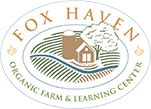Despite pandemic-driven national supply-chain problems that have left large sections of store shelves empty since March 2020, the food supply has remained relatively stable. A few food categories have suffered shortages and price increases, but there has been no crisis or famine. Maybe there won’t be as many new gadgets under Christmas trees this year, but the Christmas feast will likely still be bountiful.
However, the general supply disruptions have made many local residents feel less secure about the national food system, said Lacey Walker, director of farming at Fox Haven Farm and Retreat Center in Jefferson. She credits that insecurity for a big increase in enrollment for the farm’s annual 10-month seed foraging instruction program, which wraps up for the year on Nov. 13.
“Especially since COVID, we’ve had an uptick in people perceiving there is some food scarcity,” she said. “There’s an upsurge in interest in what [food] is growing around us and what are their seasons.”
 The Seed Saving and Propagation class is open to all curious comers, whether they have participated in this past year’s programing or not. Walker said that attending this last session of the year will provide good preparation for anyone who wants to enroll in the farm’s full annual program, which will start again in February.
The Seed Saving and Propagation class is open to all curious comers, whether they have participated in this past year’s programing or not. Walker said that attending this last session of the year will provide good preparation for anyone who wants to enroll in the farm’s full annual program, which will start again in February.
She said most people think of a plant’s life cycle as beginning in the spring but that many of the perennials they work with in their garden benefit from being planted in the fall, and that fall and winter are good times to observe the dormant stages of many plants.
Alecks Moss, the farm’s marketing and events director, said the November session of the teaching series is also when many of their garden plants are harvested for seeds, which participants are welcome to take home and plant in their own gardens.
“I think this will be a great place for people to start,” Walker said. “Then, hopefully, they’ll be primed and excited and watching the reproductive cycle in the spring.”
Moss said their instructional garden hosts more than 150 different plant species, many of which can be found growing in the wild in Frederick County. While the classes tend to emphasize the medicinal properties of the plants, many of them can double as sources of food and nutrition — or beauty. Three in particular stand out to Walker as common local plants with both medicinal and nutritional properties.
 Goldenrod is an easy plant for amateurs to identify because of its “beautiful yellow color” in September, Walker said. Many people suspect golden rod of being a seasonal allergy culprit, but she said that it’s more likely people are allergic to other common plants that grow near it. Goldenrod can actually treat allergies, she said, and the flowers are edible and have been known to improve lung, digestive and urinary health.
Goldenrod is an easy plant for amateurs to identify because of its “beautiful yellow color” in September, Walker said. Many people suspect golden rod of being a seasonal allergy culprit, but she said that it’s more likely people are allergic to other common plants that grow near it. Goldenrod can actually treat allergies, she said, and the flowers are edible and have been known to improve lung, digestive and urinary health.
Yarrow is another plant that grows throughout Frederick County like goldenrod. It has lots of tiny leaves and white umbel-shaped flowers that typically bloom in June. Walker said it has historically been used to treat wounds, due to its styptic properties, and it can help to regulate blood pressure and break fevers. She said it can also be used in place of hops for brewing beer.
Yellow Dock is another common plant in the area. A biennial root of bright yellow color, it can be used to alleviate digestive complaints, especially intestinal fermentation. It can also be ground into flour and used as a gluten-free alternative to wheat flour in many recipes. Walker has used it to make chocolate cake.
While participants will learn about the benefits of many more plants during the class, Moss emphasized that their program is not entirely focused on what nature can do for humanity.
“We weave in the ethics of foraging, what it means to work with nature in a reciprocal way,” she said. “We are looking to give as much as we take and only consume what we need.”
Next year’s teaching cycle will also consider the ethics of benefiting from the use of lands formerly held by indigenous peoples. A portion of next year’s class fees will be donated to the Piscataway-Conoy tribe, whose historical presence in Maryland gained official recognition from the state in 2012. The money will go toward the tribe’s land trust fund as a type of “back tax” for the land Fox Haven currently inhabits.
“We like to promote that we are living on indigenous land,” Walker said. “The Piscataway nation is still here, and when we are foraging, we have to do so with respect and also with understanding that we’re on land that doesn’t belong to us, that is missing the stewards in a lot of cases, even though those peoples are still alive.”
